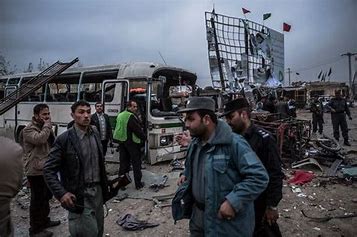NEW DELHI: The shocking assassination of Afghan minister for refugees and repatriation, Khalil ur Rehman Haqqani, and four other people on Wednesday in a suicide bombing near a mosque located on the premises of the ministry
Haqqani was leaving the mosque after attending prayers at his office near Chilsitun Road when he was targeted by an individual whose pictures were caught in the CCTV cameras.
Apart from being a sitting minister, the significance of the assassination target is in his family ties, as Rehman Haqqani was a prominent member of the influential Haqqani family. The attack is seen as a direct challenge to the Taliban leadership, striking at the core of its power structure.
Khalil ur Rehman was the brother of Jalaluddin Haqqani, who founded the Haqqani network after joining Mullah Omar’s Taliban regime in the 1990s. Khalil was considered the backbone of this network. He played a pivotal role in the Doha talks and in securing seats for the Haqqanis in the central cabinet under Afghan Supreme Leader Mullah Haibatullah Akhundzada. He was also the uncle of Afghan Minister for Interior, Sirajuddin Haqqani and his younger brother, Anas, who penned an obituary on social media after the assassination.
The assassination of such a high-ranking Taliban official and a member of the Haqqani family, that too in the heart of Kabul, has come as a rude shock for the Taliban, which has been making extensive efforts to project Afghanistan as an investment destination by working tirelessly to improve security infrastructure in the restive country.
The Taliban government, ever since taking power in August 2021, has launched an all-out offensive to eliminate armed groups, especially the Islamic State Khorasan Province (ISKP), the regional branch of the Islamic State (IS) active in South-Central Asia, primarily Afghanistan and Pakistan.
His death came just days after acting Foreign Minister Amir Khan Muttaqi was seen in a video footage riding a motorcycle through the Afghan capital, a move portrayed as a demonstration of improved security under the Taliban’s rule.
Sources in the Kabul administration stated that, prima facie, there was no indication of an insider’s role in his assassination, as has been suggested by certain sections of the media. These narratives often attribute such acts to alleged internal feuds within the Taliban, with the Haqqanis on one side and other prominent functionaries on the other.
This narrative, however, has not been substantiated by any proof and has been traced to Pakistan’s deep state assets.
Official sources in the Kabul administration, speaking to The Sunday Guardian, stated that there was no insider conspiracy behind the assassination. They explained that Haqqani often discouraged strict security measures around him to avoid inconveniencing common citizens who came to meet him, which left him vulnerable to such attacks.
However, former Tehreek-e-Taliban Pakistan (TTP) spokesperson Ehsanullah Ehsan told The Sunday Guardian that while ISKP had claimed responsibility for the attack, it should not come as a surprise if the attack was carried out on the orders of the Pakistan Army and its intelligence agency, the Inter-Services Intelligence (ISI). Ehsan cited close ties between ISKP and Pakistani army officers, which have been highlighted by The Sunday Guardian in several reports over recent years.
According to Ehsan, the Pakistani generals are upset with the Taliban leadership for not attempting to control and eliminate the TTP leadership and cadres operating along the Pakistan-Afghanistan border. He described the assassination of Khalil ur Rehman as a warning and a message to the Taliban leadership about the reach of the ISI and the General Headquarters (GHQ) in Rawalpindi, the Pakistan Army command centre, regarding Kabul.
While the General Directorate of Intelligence, Afghanistan’s national intelligence agency, is investigating this assassination and is expected to publish its findings soon, this incident is likely to create doubt among potential investors and foreign nationals, including journalists, who were planning to visit Kabul in light of the Taliban’s claims of improved security.

